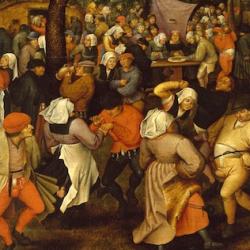Conservatives often point to the 60s as the hinge point in the history of sexual morality. They mean the 1960s.
As Faramerz Dabhoiwala shows in his Origins of Sex, the sexual revolution has much deeper roots, in the 1660s and 1760s as much as in the 1960s.
Dabhoiwala places the Enlightenment sexual revolution within a history of public discipline. He isn’t satisfied to examine shifts in “the history of private life”; he’s more interested in understanding how sexual activity was located in a zone of privacy to begin with.
Because, as he shows, this was not always the case. Throughout the medieval period, through the Reformation and beyond, sexuality was regulated by law and by a variety of non-legal control mechanisms, all of which were private.
Public regulation of sex also got caught up in class conflicts. English reform societies originally sought to address sexual deviance at every level, but in the latter part of the 17th century they became increasingly focused on disciplining the sexual lives of the lower classes. They became subjects of mocking satires, like George Farquhar’s The Constant Couple (1700), which “featured an elderly alderman, Mr Smuggler, who boasts of his exertions against vice even as he intrigues with the disreputable Madam Lurewell” (70).
A variety of factors – popular resistance, the improvement in criminals’ skill in legal defense, cost, changing notions of responsibility – led to a new situation by the middle of the 18th century: “By 1750 most forms of consensual sex outside marriage had drifted beyond the reach of the law. This was a development that could not have been foreseen in 1700, let alone a hundred years earlier, for it overturned some of the longest-established moral and legal principles in English history” (76).
Churchmen tried to keep up. Horace Walpole tells of dining with the Archbishop of York with his mistress at one of the table and his son from another mistress at the other. Reverend Charles de Guiffardière opined “Believe me, our hearts’ morality is the only morality we have to lead us, and that disgusting mass of precepts that people no longer read, that derive from I know not what absurd principles, is made only for those gross and clumsy souls incapable of ever attaining to that delicacy of taste which enables a well-born soul to feel all that is lovable in virtue and hateful in vice, independently of the ridiculous reasons advanced by our sages … Above all, devote yourself to women” (99-100).
There as no conspiracy, nor even much systematic attention to sexual ethics. But by 1800 in both England and France, tolerance and sexual freedom had become fashionable opinion. Efforts to reintroduce public discipline of sex were mounted throughout the nineteenth century, but the older system of sexual revolution had collapsed.











